We may not have the course you’re looking for. If you enquire or give us a call on + 1-866 272 8822 and speak to our training experts, we may still be able to help with your training requirements.
We ensure quality, budget-alignment, and timely delivery by our expert instructors.

Let’s dive into the fascinating world of SQL, where data transforms into actionable insights. Imagine wielding the power to unravel complex databases, extract meaningful patterns, and make informed decisions. SQL (Structured Query Language) is your gateway to this realm, allowing you to query, manipulate, and analyse data effortlessly. Whether you’re a beginner eager to grasp the basics or an advanced learner seeking optimisation techniques, there’s a perfect SQL Books waiting for you. Let’s explore these literary companions on our data-driven journey!
Table of Contents
1) Why Should You Learn SQL?
2) Top Books for Learning SQL
a) SQL All-in-One for Dummies
b) Getting Started with SQL
c) T-SQL Fundamentals
d) SQL QuickStart Guide
e) SQL Performance Explained
f) Head First SQL
g) Practical SQL
h) Murach's SQL Server
i) SQL Pocket Guide
j) SQL in 10 Minutes
3) Conclusion
Why Should You Learn SQL?
Structured Query Language (SQL) is a specialised scripting language designed for managing and manipulating data stored in Relational Database Management Systems (RDBMS). It provides a standardised interface to databases, enabling users to access, update, insert, and delete data. Understanding SQL offers numerous benefits for both individuals and organisations.
1) Universal Database Language:
SQL is the standard interface used to interact with and manage relational database systems. It is implemented by many different Database Management Systems (DBMS) including MySQL, PostgreSQL, Oracle, SQL Server, and SQLite. This means that once you master SQL, your skills are highly portable and applicable across various platforms.
2) Data Manipulation and Retrieval:
SQL allows users to perform a variety of operations on data stored in databases, such as querying, adding, updating, and deleting entries. Whether you need to access specific information, analyse data, or modify databases, SQL provides the necessary tools for efficient data handling.
3) Efficient Data Analysis:
SQL is crucial for Data Analysis tasks such as sorting, filtering, aggregating, and summarising data. It enables users to generate reports, extract insights, and make data-driven decisions effectively. With SQL, you can easily write complex commands to retrieve important data from large databases.
4) Data Integrity and Security:
SQL maintains data integrity and enforces security by allowing users to define constraints like primary and foreign keys, ensuring data consistency and preventing loss. It also supports access control to restrict permissions and protect sensitive data from unauthorised access.
5) Scalability and Performance:
Efficient database design and query optimisation are essential for the high performance and scalability of systems. Learning SQL helps you to create effective database designs, optimise queries, and enhance the overall performance of database-driven systems. This knowledge is particularly valuable for developers and Database Administrators.
6) Career Opportunities:
SQL skills are highly sought after in industries like technology, healthcare, finance, retail, and e-commerce. Proficiency in SQL opens career opportunities for Database Administrators, Data Analysts, and Software Developers, with many roles requiring SQL knowledge.
Top Books for Learning SQL
If you're looking to master SQL and enhance your data handling skills, here are some of the top books that can guide you from beginner to advanced levels.
1) SQL All-in-One For Dummies
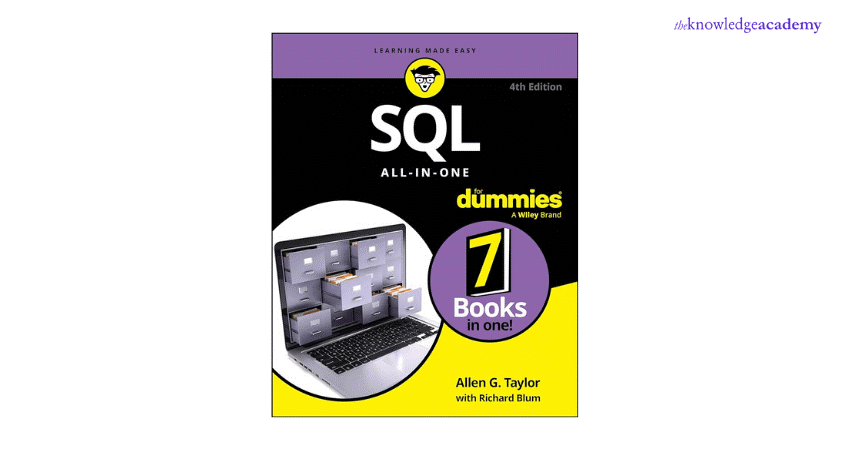
"SQL All-in-One For Dummies" is one of the best SQL Books, equipping you with everything you need to start with the SQL Programming Language and advance your skills with more complex applications. As one of the most widely used languages in professional software development, SQL is essential for anyone looking to master relational database coding and Data Analysis.
2) Getting Started with SQL
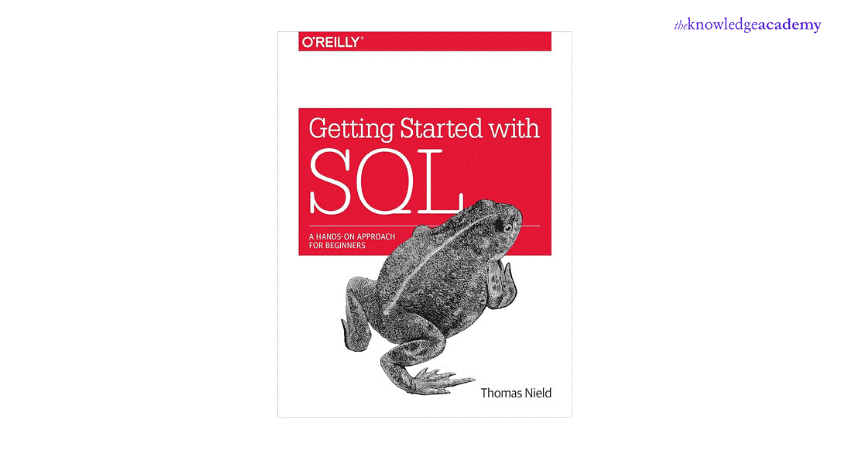
"Getting Started with SQL" is an introductory book perfect for beginners exploring SQL. It covers fundamental topics like database structure, data manipulation, and basic querying techniques. The book guides readers through setting up databases, creating tables, inserting data, and executing simple SQL queries to retrieve information.
Tailored for newcomers, it features hands-on exercises and illustrative examples that enhance practical understanding. This book provides a clear path to mastering SQL fundamentals and gaining confidence in Database Management, whether self-taught or guided.
3) T-SQL Fundamentals
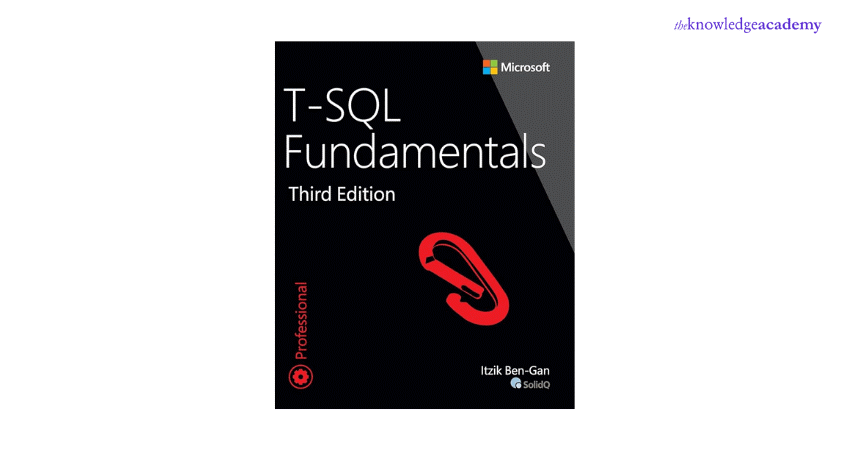
"T-SQL Fundamentals" by Itzik Ben-Gan is a comprehensive guide to Transact-SQL, the query language for Microsoft SQL Server. It covers essential T-SQL concepts and techniques for querying and modifying data. This makes it an indispensable resource for Database Developers and Administrators.
4) SQL QuickStart Guide
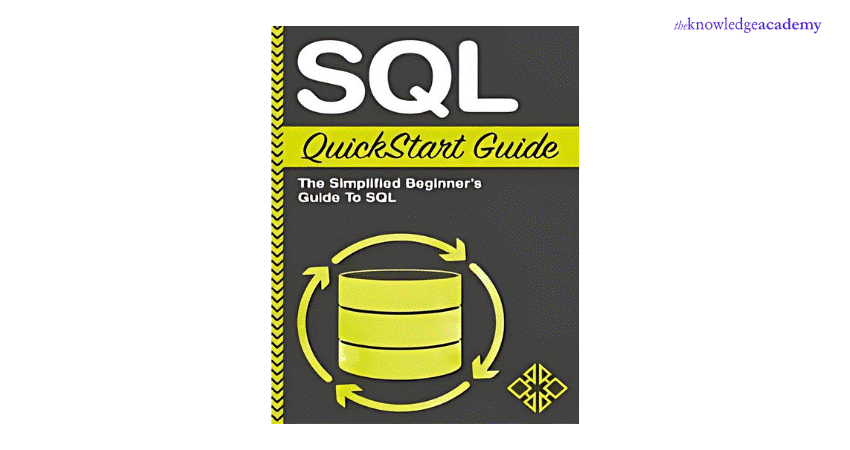
This beginner’s guide to SQL offers a straightforward exploration of key principles, complete with hands-on examples. It’s an accessible tool for newcomers eager to delve into Database Management and Data Analysis.
5) SQL Performance Explained
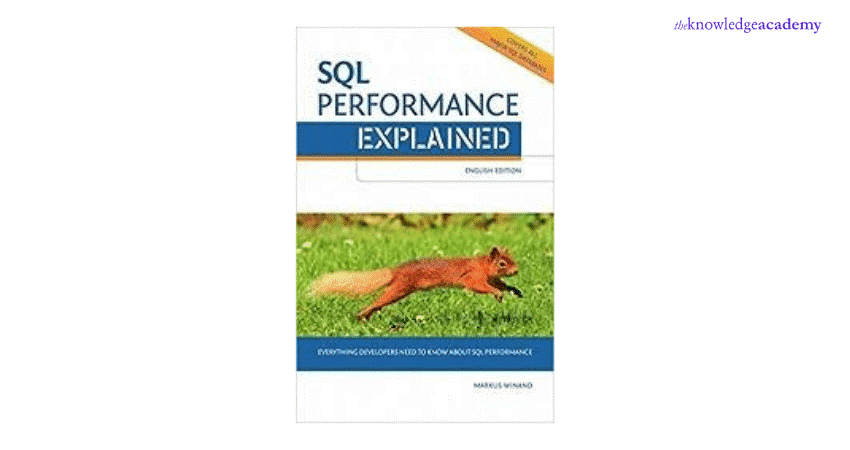
This resource is dedicated to teaching readers how to enhance the speed of SQL queries. It delves into various topics, including indexing methods, query refinement, and the principles of database structure for optimal performance.
Enhance your SQL proficiency with an expert Advanced SQL Course- join now for advanced database insights!
6) Head First SQL
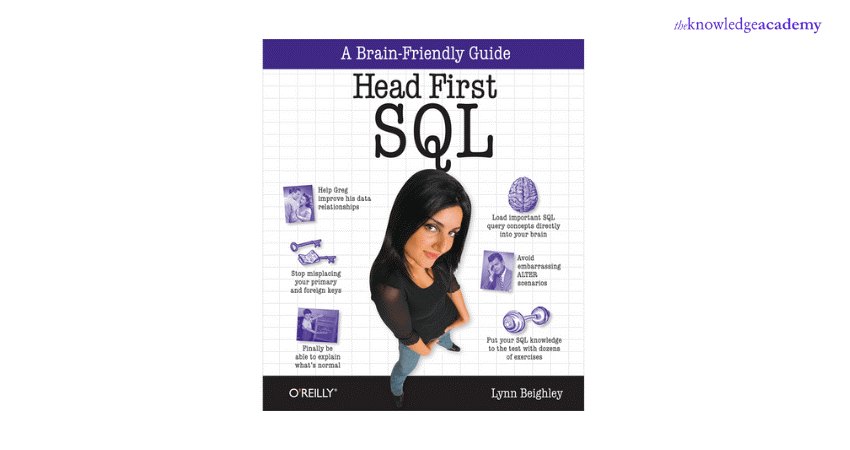
"Head First SQL" takes you on a journey through SQL. It starts with the basics of INSERT statements and SELECT queries, advancing to complex database manipulations with indices, joins, and transactions. It provides a comprehensive introduction to SQL fundamentals, enabling you to fully utilise the language.
7) Practical SQL
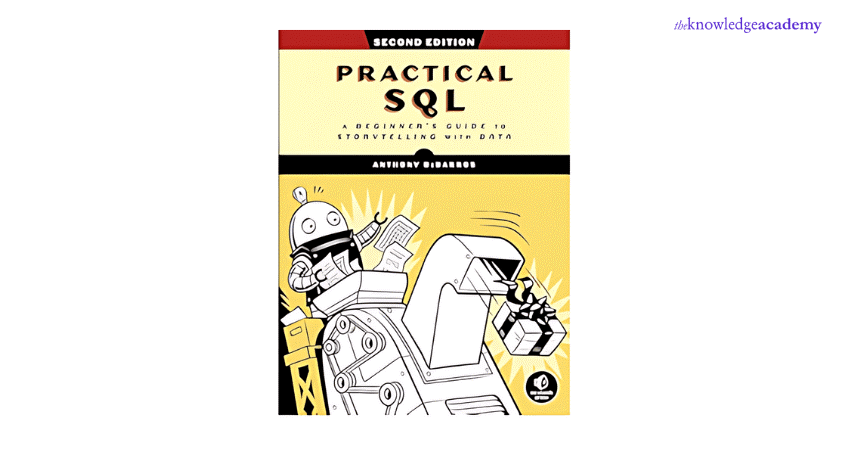
This book introduces SQL through real-life scenarios, focusing on its practical application for Data Analysis and storytelling. It covers fundamental SQL concepts and techniques for querying and visualising data to create compelling narratives.
8) Murach's SQL Server
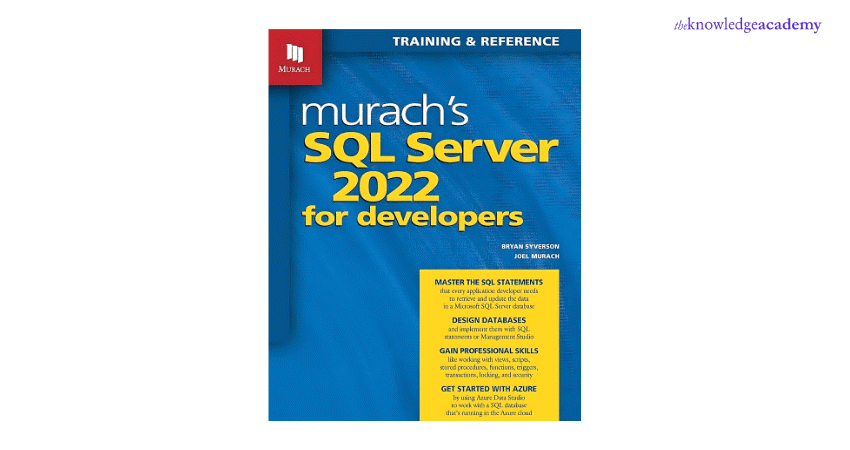
"Good SQL Books: "Murach's SQL Server" provides a comprehensive introduction to SQL and relational databases. It explains how to write SQL queries and discusses database design and implementation using SQL DDL statements or the Enterprise Manager. The book also covers advanced SQL skills, enabling readers to master data querying and visualisation for compelling data narratives."
9) SQL Pocket Guide
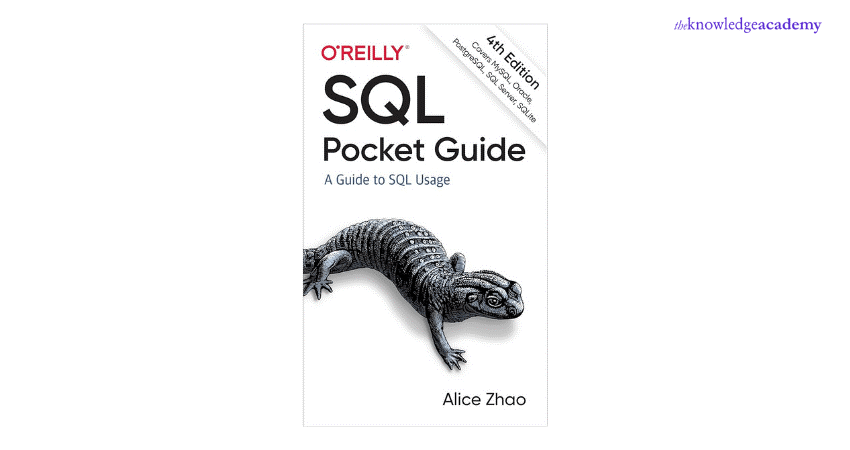
"SQL Pocket Guide" provides a concise reference on how various database systems implement SQL syntax for querying, managing transactions, and modifying data. It is an essential resource for quick, on-the-go guidance on SQL commands and their usage across different database platforms.
10) SQL in 10 Minutes
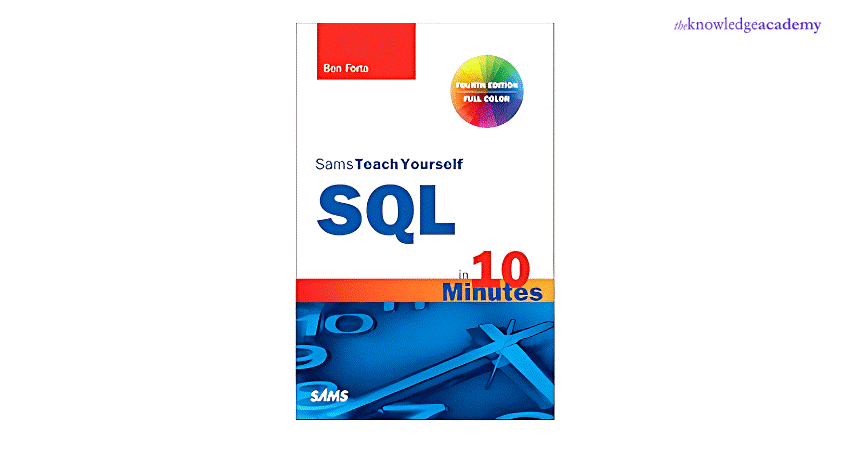
"SQL in 10 Minutes" guides you through 22 concise lessons, each taking 10 minutes or less, to master the essentials of the SQL language. Covering IBM DB2, Microsoft SQL Server and SQL Server Express, MariaDB, MySQL, Oracle and Oracle Express, PostgreSQL, and SQLite, this book is perfect for quick, effective learning.
Start learning MySQL today with our structured Introduction To MySQL Course and gain practical skills for effective Database Management!
11) SQL Cookbook
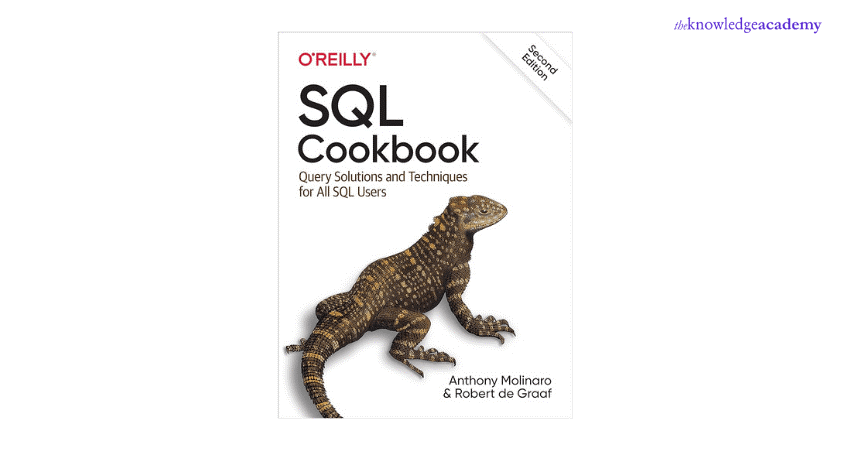
In the "SQL Cookbook," experienced SQL Developer Anthony Molinaro shares his favourite SQL techniques and features. You'll learn about window functions, one of the most significant enhancements to SQL in the past decade. You'll also discover other valuable tips and tricks for effective SQL development.
12) SQL Queries for Mere Mortals
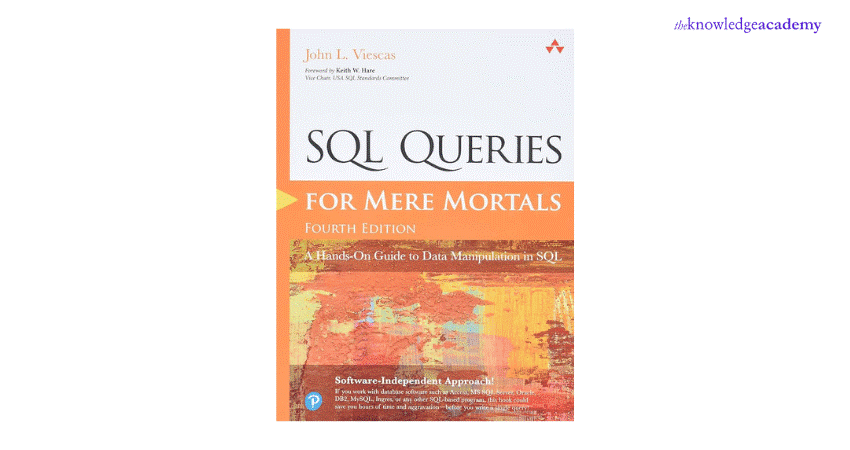
"SQL Queries for Mere Mortals" uses clear, easy-to-understand discussions and examples to guide readers from the basics to more complex SQL problems. Whether you're a novice or an expert, this book serves as an invaluable reference, allowing you to apply its concepts to various scenarios across different programs.
13) SQL for Smarties

"SQL for Smarties" explores the fundamentals of SQL programming, providing clear explanations and practical code examples. A new chapter addresses design flaws in DDL. It covers attribute splitting and non-normal form redundancies. Additionally, it discusses table splitting, making it a comprehensive guide for advanced SQL users aiming to optimise their database design and queries.
14) Learning SQL: Generate, Manipulate, and Retrieve Data
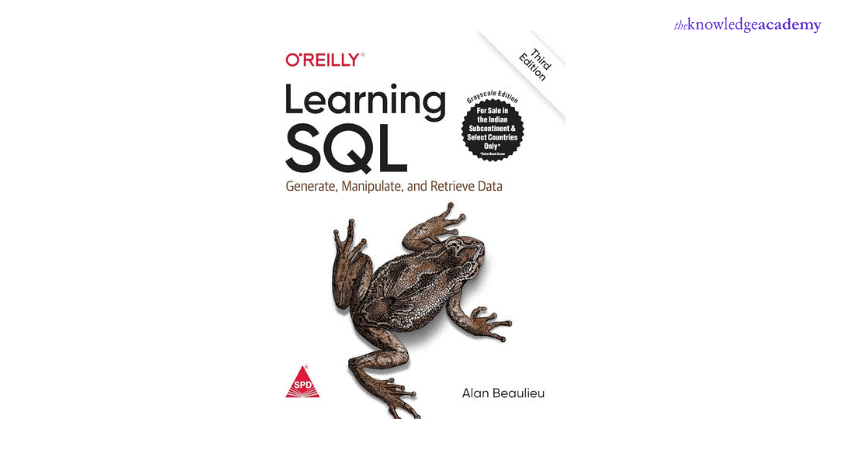
"Learning SQL: Generate, Manipulate, and Retrieve Data" by Alan Beaulieu equips developers with essential SQL skills for writing Database Applications, performing administrative tasks, and generating reports.
The latest edition includes new chapters on SQL and big data, analytic functions, and handling large databases. Each chapter provides a self-contained lesson with illustrations, examples, and exercises, making it an invaluable resource for mastering SQL fundamentals and practical applications.
15)SQL for Data Analytics
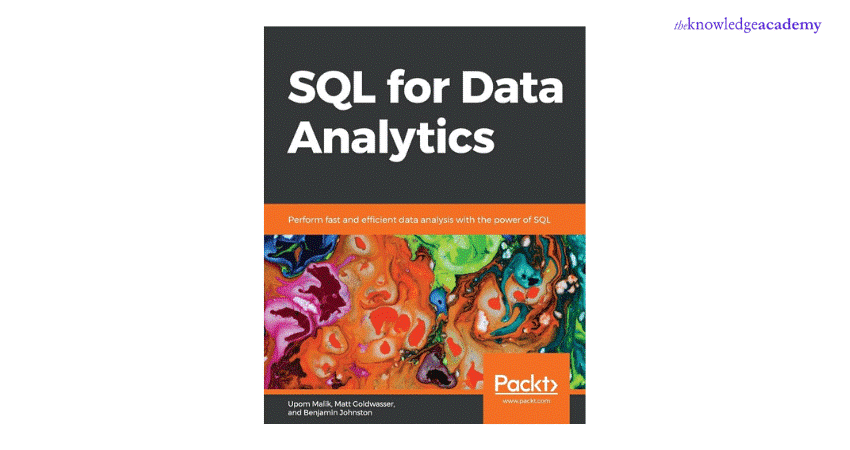
"SQL for Data Analytics" covers everything you need to progress from basic SQL to identifying trends and creating compelling data narratives. This book equips you to analyse data with the critical eye of an analytics professional. It allows you to extract meaningful insights that can significantly enhance your business.
Take your career to the next level with our SQL Courses - join now to master essential Database Management skills!
Conclusion
In the vast universe of SQL, knowledge is your compass. As you delve into these carefully curated SQL Books, remember that each page holds a key to unlocking your data prowess. Whether you’re deciphering complex queries or optimising database performance, these literary companions will guide you toward mastery. So, embrace the journey, absorb the wisdom, and let SQL be your trusted ally on the path to data enlightenment!
Kickstart your SQL journey today with our tailored Introduction To SQL Course designed to enhance your data management skills effectively!
Frequently Asked Questions

The most challenging aspect of learning SQL is mastering complex queries, particularly involving joins, subqueries, and optimisation techniques. Understanding how to efficiently manipulate and retrieve data from large datasets can be difficult but crucial for advanced SQL proficiency.

The most challenging aspect of learning SQL is mastering complex queries, particularly involving joins, subqueries, and optimisation techniques. Understanding how to efficiently manipulate and retrieve data from large datasets can be difficult but crucial for advanced SQL proficiency.

The Knowledge Academy takes global learning to new heights, offering over 30,000 online courses across 490+ locations in 220 countries. This expansive reach ensures accessibility and convenience for learners worldwide.
Alongside our diverse Online Course Catalogue, encompassing 17 major categories, we go the extra mile by providing a plethora of free educational Online Resources like News updates, Blogs, videos, webinars, and interview questions. Tailoring learning experiences further, professionals can maximise value with customisable Course Bundles of TKA.

The Knowledge Academy’s Knowledge Pass, a prepaid voucher, adds another layer of flexibility, allowing course bookings over a 12-month period. Join us on a journey where education knows no bounds.

The Knowledge Academy offers various SQL Courses, including Introduction To SQL, Advanced SQL, Introduction to MySQL Course and SQL Server Reporting Services (SSRS) Masterclass. These courses cater to different skill levels, providing comprehensive insights into SQL Index.
Our Programming & DevOps Blogs cover a range of topics related to SQL, offering valuable resources, best practices, and industry insights. Whether you are a beginner or looking to advance your SQL Skills, The Knowledge Academy's diverse courses and informative blogs have got you covered.
Upcoming Programming & DevOps Resources Batches & Dates
Date
 Introduction to SQL
Introduction to SQL
Fri 17th Jan 2025
Fri 21st Feb 2025
Fri 4th Apr 2025
Fri 6th Jun 2025
Fri 8th Aug 2025
Fri 10th Oct 2025
Fri 26th Dec 2025







 Top Rated Course
Top Rated Course



 If you wish to make any changes to your course, please
If you wish to make any changes to your course, please


